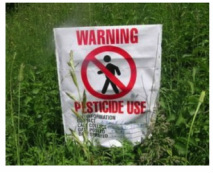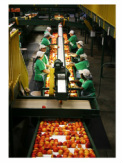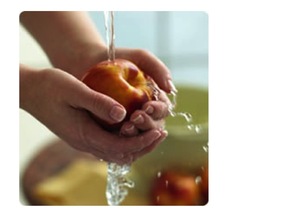Impact of Peach Farming
Since their introduction to Georgia in the 16th century, the peach industry’s impact on bio-diversity has been small. Peach trees are not an invasive species, and their introduction has not been blamed for a decrease in bio-diversity (flora or fauna) as Georgia still enjoys a rich, diverse bio-system.
Negatives on the Environment

Pesticide Warning in Orchard
However, peach production does have some negative environmental impacts. The three primary issues relate to: pesticides, water use, and fertilizers.
Farmers try to protect the peach trees as much as possible, and they use pesticides to help control fungus and keep insects off of the trees. As that is good for the trees, it might be a potential danger to us. The pesticides may stay on the peaches we eat, and if we eat too much on our food, it could harm our health.
Peaches need approximately 36 inches (91 cm) of water each year for best growing results. In relative terms, peach trees are not “thirsty” trees. Locally, in Georgia, the peach-growing-counties average roughly 45” inches (114 cm) of rainfall a year. If there is a drought, peach trees might die so farmers use field irrigation systems to add to natural rainfall. If peach trees die, there will be a few downsides, namely a reduction in soil moisture due to the loss of the tree’s shade and roots system and the loss of top soil which reduces soil quality and productivity.
In addition to pesticides and water use, farmers use fertilizer to help their peach trees grow. In general, farmers use a cup of fertilizer for each year of the tree’s age. For instance, a ten year old tree would need 10 cups of fertilizer while a one year old tree only needs 1 cup of fertilizer. Fertilizers have a downside to them if overused as they can be harmful to wildlife and to natural water systems, like the underground aquifers found in Georgia.
Farmers try to protect the peach trees as much as possible, and they use pesticides to help control fungus and keep insects off of the trees. As that is good for the trees, it might be a potential danger to us. The pesticides may stay on the peaches we eat, and if we eat too much on our food, it could harm our health.
Peaches need approximately 36 inches (91 cm) of water each year for best growing results. In relative terms, peach trees are not “thirsty” trees. Locally, in Georgia, the peach-growing-counties average roughly 45” inches (114 cm) of rainfall a year. If there is a drought, peach trees might die so farmers use field irrigation systems to add to natural rainfall. If peach trees die, there will be a few downsides, namely a reduction in soil moisture due to the loss of the tree’s shade and roots system and the loss of top soil which reduces soil quality and productivity.
In addition to pesticides and water use, farmers use fertilizer to help their peach trees grow. In general, farmers use a cup of fertilizer for each year of the tree’s age. For instance, a ten year old tree would need 10 cups of fertilizer while a one year old tree only needs 1 cup of fertilizer. Fertilizers have a downside to them if overused as they can be harmful to wildlife and to natural water systems, like the underground aquifers found in Georgia.
Reducing Negative Impact

Peach Processing LIne
Most peach farmers live on their farm land, and they try to be good stewards by taking care of it. Some of their practices intend to make a better future for their families and communities. For instance, farmers donate $0.10 per bushel of peaches for research. They have given hundreds of thousands of dollars to help create more hearty varieties of peaches that repel insects and don’t require as much fertilizer or water. Even though farmers have given large sums of money to create heartier peaches, farmers have adopted different ways to grow peaches in a more environmentally friendly manner. Some examples include letting grass grow in-between peach trees, brushing off pesticides before shipping off the peaches from a packing line, and cleaning packing equipment daily. These last two efforts reduced pesticide residue levels by more than 300%. At home, washing fruits and vegetables before eating makes a safe product even safer.
YouTube Links

Home washing helps reduce pesticide residue.
Below are links that might help you to further understand my topic:
1) Drought impact on economy
http://youtu.be/FzuwWHId4KM
2) Environmental issues/working with regulators and Farm Bureau to better peach farming
http://youtu.be/N9UXNaihV74
3) Benefits to state
http://youtu.be/_JKFS_m4IQw
1) Drought impact on economy
http://youtu.be/FzuwWHId4KM
2) Environmental issues/working with regulators and Farm Bureau to better peach farming
http://youtu.be/N9UXNaihV74
3) Benefits to state
http://youtu.be/_JKFS_m4IQw
